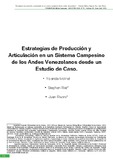Mostrar el registro sencillo del ítem
Estrategias de producción y articulación en un sistema campesino de Los Andes Venezolanos desde un estudio de caso
| dc.rights.license | http://creativecommons.org/licenses/by-nc-sa/3.0/ve/ | |
| dc.contributor.author | Molina, Yolanda | |
| dc.contributor.author | Rist, Stephan | |
| dc.contributor.author | Rivero, Juan Carlos | |
| dc.date.accessioned | 2017-02-06T17:16:55Z | |
| dc.date.available | 2017-02-06T17:16:55Z | |
| dc.date.issued | 2015-01 | |
| dc.identifier.issn | 0798-3069 | |
| dc.identifier.uri | http://www.saber.ula.ve/handle/123456789/42983 | |
| dc.description.abstract | El estudio de caso se llevó a cabo en la Parroquia Chacantá, ubicada en los Andes Venezolanos, cuya área ocupa 153 km2en la que habitan unas 300 familias, distribuidas en 19 aldeas. El objetivo de la investigación se orientó a identificar y analizar las estrategias de producción y articulación que usan las familias en un sistema agrario campesino, considerando estos aspectos fundamentales en la promoción de un Desarrollo Rural Sostenible y Agroecológico. Se trabajó con tres tipos de unidades de producción cuyo estilo de manejo está determinado básicamente por su tamaño. La metodología siguió el enfoque cualitativo a través de las herramientas de investigación: observación participante, relatos de vida y entrevistas semiestructuradas, siguiendo el enfoque etnográfico y la hermenéutica en la descripción e interpretación de los resultados; complementando con datos cuantitativos. Los resultados muestran estrategias de producción y articulación centradas en la familia, respondiendo tanto a las necesidades de alimentación como de la ocupación de su fuerza de trabajo; así, se establece una economía integrada basada en la articulación entre familias y aldeas que representa una economía de reciprocidad, con la circulación interna de medios de producción, productos y servicios, así como el relacionamiento entre las organizaciones e instituciones comunitarias; y una economía de mercado que representa la articulación hacia el exterior de la parroquia, a través del intercambio de insumos y productos, que a la vez demanda la atención de las instituciones del estado encargadas de administrar las políticas públicas agrícolas. | es_VE |
| dc.language.iso | es | es_VE |
| dc.rights | info:eu-repo/semantics/openAccess | |
| dc.subject | Chacantá | es_VE |
| dc.subject | Estrategias de producción | es_VE |
| dc.subject | Estrategias de articulación | es_VE |
| dc.subject | Campesinado | es_VE |
| dc.subject | Agroecología | es_VE |
| dc.subject | Agrodiversidad | es_VE |
| dc.subject | Andes Venezolanos | es_VE |
| dc.title | Estrategias de producción y articulación en un sistema campesino de Los Andes Venezolanos desde un estudio de caso | es_VE |
| dc.title.alternative | Productions strategies and articulation in a peasant system in the Venezuelan Andes. A study case | es_VE |
| dc.type | info:eu-repo/semantics/article | |
| dc.description.abstract1 | The study case was carried out in Chacantá parish, located in the Venezuelan Andes, in an area occupying 153 km2, inhabited by three hundred families, distributed in 19 villages. The objective of this research was oriented to identify and analyze the production strategies and articulation that are used by families in a peasant agrarian system, considering these aspects as fundamental in the promotion of a Sustainable Rural and Agroecological Development. The study was performed with three types of production units and its management style is basically determined by its size. The methodology followed the qualitative approach, through the research tools: participant observation, life stories and semiestructured interviews, following an ethnographic approach and the hermeneutics in the description and interpretation of the results, complemented with quantitative data. The results show production strategies and articulation centered in the family, responding both the alimentary needs as well as the occupation of its labor force, as a consequence, it is established an integrated economy based on the articulation between families and villages representing an economy of reciprocity with the internal circulation of production means, products and services and the relationship between organizations and communitarian institutions and a market economy that represents the articulation of the parish towards the exterior, through the interchange of consumable supplies and products, that at the same time require the attention of the State institutions in charge of managing the agriculture public politics. | es_VE |
| dc.description.colacion | 53-64 | es_VE |
| dc.description.email | ymolina@ula.ve | es_VE |
| dc.description.email | stephan.rist@cde.unibe.ch | es_VE |
| dc.description.email | jrivero@ula.ve | es_VE |
| dc.description.frecuencia | Trimestral | |
| dc.identifier.depositolegal | 1991102ME302 | |
| dc.publisher.pais | Venezuela | es_VE |
| dc.subject.centroinvestigacion | Centro de Investigaciones en Ciencias Humanas (HUMANIC) | |
| dc.subject.facultad | Facultad de Humanidades y Educación | es_VE |
| dc.subject.idioma | es | |
| dc.subject.institucion | Universidad de Los Andes | es_VE |
| dc.subject.keywords | Chacantá | es_VE |
| dc.subject.keywords | Production strategies | es_VE |
| dc.subject.keywords | Articulation strategies | es_VE |
| dc.subject.keywords | Peasantry | es_VE |
| dc.subject.keywords | Agroecology | es_VE |
| dc.subject.keywords | Agrodiversity | es_VE |
| dc.subject.keywords | Venezuelan Andes. | es_VE |
| dc.subject.seccion | Revista Fermentum: Artículos de Investigación | es_VE |
| dc.subject.thematiccategory | Artes y Humanidades | es_VE |
| dc.subject.tipo | Revistas | es_VE |
| dc.type.media | Texto | es_VE |
Ficheros en el ítem
Este ítem aparece en la(s) siguiente(s) colección(ones)
-
Fermentum - Año 025 - Nº 72
enero - abril 2015


